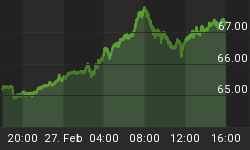The following is part of Pivotal Events that was published for our subscribers December 20, 2012.
Signs of the Times
"FOMC is probably the most academically driven in history."
~ Dallas Fed President, Richard Fisher, December 14
He was, again, commenting on Fed policy and if you think it is Fed-Speak for "dangerously impractical", you're right. He continued with:
"We're going to have an engorged balance sheet and we may never be able to leave this position. We are at risk of what I call a 'Hotel California' monetary policy, going back to the Eagles song which is, you can check-out any time you want, but you can't leave."
The old saying is "Never fight the Fed", but what do you do when the Fed is fighting itself?
"The biggest year for debt backed by leveraged loans since the peak in 2007 will be eclipsed in 2013."
~ Bloomberg, December 12
"Spanish regional governments have accumulated EU13 billion of unpaid supplier bills in the first nine months of the year."
~ Bloomberg, December 12
"Mohammad Safi, a graduate of a medical school in Afghanistan, began working as psychologist at a California mental hospital, making $90,680 in his first six months. Last year, he took home $822,302, all of it paid by taxpayers. A court forced the state to improve inmate care, forcing a bidding war."
~ Bloomberg, December 12
Perspective
It seems to be time to recall some comments on financial manias by Ludwig von Mises:
"There is no means of avoiding the final collapse of a boom brought about by credit expansion. The alternative is only whether the crisis should come sooner as a result of voluntary abandonment of further credit expansion, or later as a final and total catastrophe of the currency system involved."
It is a valid assessment, but the last line should end with catastrophe of the credit system.
That would be the next step in our post-bubble contraction.
Essentially, Richard Fisher is boldly making sense in a world of wild policymakers.
Benjamin Anderson was an economist who wrote a monthly comment when he was with Chase National Bank during the "Roaring Twenties". While many were not fully aware of what was going on, Anderson got it right.
Will the next liquidity crisis arrive "sooner....or later"?
Will it be triggered by central bank decision, or by market forces?
Credit Markets
As the saying goes, "Credit is money of the mind". In the early 1900s, J.P. Morgan said that he would make a loan to a man, based solely on strength of character. Showing less discrimination, the Fed has been able to "create it out of thin air". More lately, Bernanke has the ability to "throw it out of helicopters".
However, another old saying may apply "Credit is suspicion asleep".
Essentially, the two older observations represent generations of financial wisdom - learned the hard way. As the term implies, credit markets are market driven. And we have noting that the no matter how intense the current central bank experiment has become it will not be successful. The harder the push now, the more severe the pushback.
In the meantime, while we've been complacent about corporate bonds there has been a couple of reversals. After reaching an exceptional oversold, the Ted-Spread has taken a turn to widening. We don't know how significant this is. With T-bill rates at almost zero a few ticks one way or the other can change the yield ratio between bill and the euro rates by an impressive amount. Especially when the Libor rate shows little change.
We're not sure if it really means anything, but the trend has changed.
It could have something to do with the latest Fed folly. The policy of selling bills to buy bonds (a ploy called Operation Twist) was changed in favor of buying bonds and not selling bills. Just buy everything, other than bills!
Fiduciary responsibility has been displaced by academic theories.
Over in the municipals, the MUB soared up to the most overbought since September 2010 - just before that mini-panic. The price plunged from 99.4 to 90. This time around the plunge from the end of November was fast and amounted to only five points.
A December 12 news report of a downgrade for Illinois from stable to negative might have helped the slide. Oversold now, stability should follow.
Credit markets will remain fascinating until the bubble bursts. The usual technical tools have anticipated modest moves when bigger ones seem possible.
Commodities
Last week, we noted that the stair-step decline in agricultural commodities was approaching an oversold condition. The GKX has continued its decline from 470 last week to 450. At the high of 533 in the July drought concerns, the daily RSI topped at 75, it is now at 28.
Stability is just around the corner.
The interesting thing is that this sector is indicating that, so far as inflation goes, the Fed just can't the some old "bang for the buck" that they could in the 1970s. Much of the inflationary stimulus has been going into the bond markets.
Coming out of the early November low, base metals enjoyed a decent rally. Last week we reviewed out position for a rally into January. The conclusion was that while the RSI was approaching an overbought, it was time to "declare a victory" and have some Christmas Punch.
Last week's high was 397 and now it is at 382. There is support at the 375 to 380 level.
Overall, the CRB and crude are at neutral momentum and could trade in a range over the next six weeks.
Link to December 21 'Bob and Phil Show' on TalkDigitalNetwork.com: http://talkdigitalnetwork.com/2012/12/uh-oh-cliff-hits-the-fan















